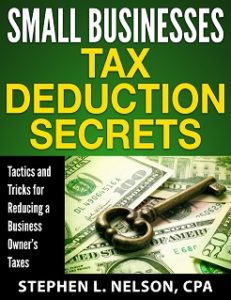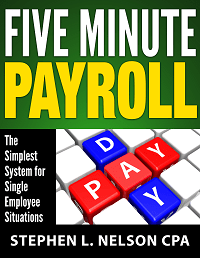
Thinking about hiring your children as a tax loophole? Probably because it’s summer, several clients and friends have recently asked me about this.
And the question is good one. This gambit often makes for great tax savings. You can save thousands in taxes. Per kid.
But you may find this deduction tricky to take. Accordingly, let me explain why you save money, how you can save even more money by doing this right, and then point out where and how people can get tripped up if they’re not careful.
Kids and Grandkids as Income Tax Loopholes
Employing your children usually saves quite a bit of income tax for a simple reason.
You may pay a pretty high tax rate on your last dollars of income. For example, you might pay 25% or 28% in federal taxes and probably a very noticeable state income tax, too.
If you’ve got a really successful business, given the progressive nature of income taxes, you might pay even higher marginal rates on your last dollars of income. Federal income tax rates go as high as basically 40%.
In comparison, if you hire your son or daughter (or even your grandson or granddaughter) and you do the accounting right, they will pay no federal income taxes on the first $6,300 they make in 2017. They will probably pay very little state income tax. And even if they make more, the federal and state tax rates will be low. A child or grandchild might make as much as $20,000 a year and pay an average tax rate of less than 10%, for example. And that tax bill might be easily ground down to nearly zero if the child or grandchild qualifies for tax credits the business owner can’t use.
In short, paying a generous wage to a family member can save a business owner substantial taxes.
Example: You pay your son or daughter $5,000 on which you would have paid a combined 30% federal and state income tax. Your son or daughter will pay no income taxes. Zero. In this case, you reduce your income tax bill by $1,500.
 Tip: Federal and state tax laws actually provide small businesses with dozens of powerful tactics for cutting taxes. The “putting your kids on the payroll” is just one example…
Tip: Federal and state tax laws actually provide small businesses with dozens of powerful tactics for cutting taxes. The “putting your kids on the payroll” is just one example…
Accordingly keep your eyes open for other loopholes.
And if you want help or more information about how to take advantage of these “secrets hidden in plain sight,” consider our popular downloadable monograph “Small Businesses Tax Deduction Secrets“.
Minor Children as Payroll Tax Loopholes
If you operate as a sole proprietor or you and your spouse operate a partnership and you employ your own minor children, you may be able to save even more tax.
Here’s why: You won’t need to pay, and the kids won’t need to pay, Social Security, Medicare or FUTA taxes on their wages if the kids are minors.
I’m going to ignore the FUTA tax because it’s tough to generalize about that. (The actual tax rate you pay for FUTA depends on whether or not your business pays state unemployment taxes.)
But to focus on just the Social Security and Medicare taxes, those add up to 15.3% of the wages paid if you combine both the employer and employee shares.
If you have $5,000 of income on which you as proprietor would pay a 15.3% tax, that adds up to $765 of taxes. If you pay that $5,000 to your son or daughter instead, you therefore save the $765 that you would have had to pay had the income been counted as yours.
Let me add up the savings we’ve identified, okay? In some cases, by paying a son or daughter $5,000 in wages, you may be saving more than $2,000 in taxes. Maybe $1,500 in income taxes. Maybe another $765 in Social Security and Medicare taxes. Yikes. It adds up quick, right?
Note: The Internal Revenue Service website has a page with a nice write-up on how the payroll tax accounting works with family employees. Click here if you’re interested.
 Tip: If you’re interested in this idea of putting your kids on the payroll because you’ve got rental property investments, you should know that works.
Tip: If you’re interested in this idea of putting your kids on the payroll because you’ve got rental property investments, you should know that works.
But you should also know that real estate investments provide many other ways to save for retirement and to minimize income taxes.
If you are investing in real estate, we’ve got a downloadable reference many new real estate investors will find invaluable, our $40 “Real Estate Tax Loopholes and Secrets” monograph.
But You Need to Be Reasonable
Obviously, the gambit of employing your kids, and even your grandkids, can be a real tax saver. But let me issue a handful of comments and caveats.
Here’s my first caution: You have to be reasonable in all this. In other words, the amount you pay your child or grandchildren or whatever needs to be reasonable.
Just to make this point, you writing the check doesn’t automatically create a deduction. The deduction only works if you’re paying someone a reasonable wage given the job they’re doing for your business.
I’m going to quote here from the relevant Treasury Regulation just because that seems like a good idea. Note that you can skim the quoted material and focus just on the parts I boldfaced and italicized—the highlighted material is what you want to internalize:
§ 1.162-7 Compensation for personal services.
(a) There may be included among the ordinary and necessary expenses paid or incurred in carrying on any trade or business a reasonable allowance for salaries or other compensation for personal services actually rendered. The test of deductibility in the case of compensation payments is whether they are reasonable and are in fact payments purely for services.
(b) The test set forth in paragraph (a) of this section and its practical application may be further stated and illustrated as follows:
(1) Any amount paid in the form of compensation, but not in fact as the purchase price of services, is not deductible. An ostensible salary paid by a corporation may be a distribution of a dividend on stock. This is likely to occur in the case of a corporation having few shareholders, practically all of whom draw salaries. If in such a case the salaries are in excess of those ordinarily paid for similar services and the excessive payments correspond or bear a close relationship to the stockholdings of the officers or employees, it would seem likely that the salaries are not paid wholly for services rendered, but that the excessive payments are a distribution of earnings upon the stock. An ostensible salary may be in part payment for property. This may occur, for example, where a partnership sells out to a corporation, the former partners agreeing to continue in the service of the corporation. In such a case it may be found that the salaries of the former partners are not merely for services, but in part constitute payment for the transfer of their business.
You get the point. The job you provide your son or daughter needs to be a real job.
You Want to Be Diligent about Documentation and Bookkeeping
A related caution: If you are examined by a federal or state auditor, the auditor will naturally expect you to convince them of the reasonableness of your employment arrangement.
Accordingly, you want your recordkeeping and payroll tax accounting to all tell the same story. Make sure you’ve got any state permits necessary to employ children, for example. Do the payroll for your kids the same way another employer would do payroll for a non-family-member employee. (Maybe you want to use timeslips?) Pay an obviously fair market rate.
Note: Probably paying $15-an-hour, even for a teenager, works pretty well in any community that is rolling out or discussing actively the $15-an-hour minimum wage law.
Make Sure You Aren’t Losing Money
A quick comment that’s sort of off-topic but still super economically relevant: You will reduce taxes by employing a child in most situations. No argument there.
But if your new employee isn’t doing a real job that you need someone to do, you’re not necessarily saving money.
What would be a better deal, probably, would be if your son or daughter worked for some other business owner—somebody other than Mom or Dad—and did real work earning a real wage for this other employer. (This approach might also be a good step toward independence and developing good work habits.)
This makes sense, right? You don’t really make money if you pay Biff (your son) or Buffy (your daughter) $5,000 so you can save $2,000 in taxes. You actually lose $3,000 in this case (unless you make the kids pay the $3,000 back to you in some way—which really means the money was never really their wages.)
Working the Working Condition Fringe Benefit Angle
Let me give you something else to think about, too.
While the payroll tax and income tax savings angles are often what business owners focus on, some business owners may have another truly powerful tax planning angle they can employ.
I can’t describe this option here in detail—we don’t have space—but let me give you a quick overview. If your son or daughter works in your business and the business pays for training that lets them do their job better but also training that doesn’t prepare them for a new profession, you may be able to deduct those training costs as a “working condition” fringe benefit.
Let me give you some examples that show how this might work—and also when this won’t work.
Example #1: You run the construction firm your father started. Your son or daughter, who already works in the business, will someday take the reins from you and run the business. In this case, you can probably deduct most and maybe (depending on the program) all of the tuition costs for a degree in construction management or business administration. The tuition is deductible, by the way, because it lets you son or daughter do their current job better—not because it prepares them for the role of someday running the construction company.
Example #2: You run a small law firm in which your son or daughter works as an office manager or legal assistant. In order to do their job better, you pay for a college degree in business administration or some pre-law degree or some technical program in being a legal assistant. In this case, you may be able to deduct most and again maybe even all of the tuition costs for the degree if the training helps your son or daughter do their existing job better, but doesn’t prepare them for a new profession.
Example #3: Let me now give you an example of when this deduction clearly does not work. Suppose you run a small law firm in which you son or daughter works. Further, suppose you pay for your son or daughter to attend law school—you know, so they can do their job better and someday take over the family law firm. Can you deduct the costs of law school? No. This course of study prepares your son or daughter for a new profession, being a lawyer. Therefore, the expense doesn’t qualify as a working condition fringe benefit.
Summing Up the Hiring-Your-Children-as-a-Tax-Loophole Gambit
A couple of final comments: First, lots of small business owners probably should consider hiring their children. The move may make great sense not only for tax savings reasons but also for long-term strategic reasons.
Second, if you decide to do this, you need to do your accounting cleanly and make sure the arrangement clearly makes business and economic sense. If you don’t do the accounting right or you don’t create a real job, sorry, you won’t sustain your tax savings if the IRS or equivalent state revenue agency challenges you.
Need Help with Family Payroll? Check out our Five Minute Payroll Monograph
Want to take an informal and accelerated approach to payroll for your small business? Perhaps because you’ve hired a family member or employ only yourself? You may be interested in our Five Minute Payroll monograph.
Our Five Minute Payroll monograph explains how to do simple cookie-cutter payroll for most one-employee situations using base salary amounts of $10,000 a quarter or $16,000 a quarter. (These amounts should work for just about everyone.) The monograph includes sample and nearly-complete IRS forms which you can copy to get payroll tax returns done in a few minutes. And the monograph provides some common-sense tips you can use to set a reasonable salary for yourself or a family member you employ.
Interested in our $20 monograph? Use this button:
Money Back Guarantee
All our digital products come with a money back guarantee. If you don’t think our monograph is worth it, just let us know (email works best) and we’ll refund your purchase price. By the way, we do promise the monograph delivers great value. Once you learn our “Five Minute Payroll” system you can skip paying some outside payroll service hundreds of dollars each year. And you’ll also reduce your payroll return preparation to, oh, about five minutes a year…
P.S. Interested in more articles like this? You can subscribe to the email newsletter version of the blog post by clicking the green Follow button that appears below.

Thanks for the great article.
Will there be any difference in tax or financial advantages when hiring 18 year or older kid as an employee vs. as an independent contractor.
If you hire someone who’s 18, you’ll need to pay payroll taxes both at the state and federal levels. So with kids who have reached age of majority, you probably save income taxes and you may get them credits (for education for example)… but you won’t save payroll taxes.
If you enter into an independent contractor arrangement with someone (including a child), they will have to pay self-employment taxes unless they have very modest self-employment income (less than $400 or so)… but they will probably be able to deduct any of the expenses of running their independent contractor business–and these totally deductible expenses might produce pretty sizable income tax and self-employment tax savings.
Great points, Steve, particularly the part about “reasonable compensation”. With the potential for big tax savings it is logical for a business owner to want to maximize a child’s compensation.
With earned income the kid can make an IRA contribution.
Excellent point Chris, I started a custodial ROTH IRA for my minor daughter after the 2008 stock market crash consisting of a quality mutual fund allocation.
Its a win win situation for all.
Is there a minimum age you can hire a child? For example, I want to hire my infant child as Model my clothing line. Can I pay her for modeling, so she can start a savings and I get can tax benefits?
Thanks!!
In Seattle area, I’d normally think you can pay $15 an hour even to a child since we as a community have decided that is the absolute minimum any worker is worth…
With an infant, hmmm, that’s trickier. I would think you’d instead want to find some third party source for modeling fees. There is probably some industry standard amount you could use.
Thanks for a great article, Steve. I want to start a ROTH IRA for my kid. She is 7 and is helping out with babysitting her baby sister. We don’t have any business so how would we pay her so she can contribute to her IRA? Thank you in advance for your reply.
I don’t think you can make that work. Sorry.
This article is about hiring for a business. Money for household chores doesn’t count. Babysitting for a neighbor would count, but I doubt too many neighbors want a 7 year old baby-sitting.
In my partnership, my husband and I both own 49% each, while my dad owns 2% of the partnership. Can I still hire my kids as employees and not have to pay Social Security, Medicare or FUTA taxes on their wages if the kids are minors? Or, because my dad owns 2% do my partnership not qualify for this?
Because of your dad, I believe you can’t avoid payroll taxes. Sorry.
I was paying them as independent contractors because they make their own schedules, send me invoices, etc. and are actually pretty independent. That should work okay, right?
If your kids are independent contractors, then they’ll pay the 15.3% self-employment taxes (same as combined employee/employer payroll taxes) on their returns.
how do I qualify to hire my grandchildren under 18
Hi Ken, not sure if I understand your question… but you just hire them… for a real job… like you would hire any other employee.
Two reminders/clarifications: You won’t avoid the payroll taxes for a grandchild… that works for minor children employed by a parent operating as a sole proprietorship or by parents operating a partnership. And you may need to check on state labor laws related to employing children.
I own two business I can hire my son for legitimately but dont child labor laws come in to play?
*I own some rental properties where I currently pay someone to take out garbage and vacuum the hallwys
*My wife owns and amazon business where we ship products in to amazon. Every item needs a label that goes over the barcode and items need to be put in a common box.
My issue is that he is under 12 (by a ways actually) but being an entrepreneur family, it is natural to me to get him involved at a young age. We are in NJ and the laws on this are clear as mud.
You want to call the state employment agency in NJ and ask if you can hire a minor. Their rules will determine whether or not you can do this.
Often you need a special permit to hire minors. and sometimes special rules apply to parents employing their kids.
I own a ballet studio. Can I pay my child for being in my marketing photos and videos?
If you’ve got a child modeling for photos, yeah, I think so.
I wouldn’t go hog wild. And you’d want to try to find out what market rates are in your area…
1. “Kids and Grandkids as Income Tax Loopholes”
How is hiring grandkids a tax loophole? Your comment says you cannot avoid social security/medicare tax for grandchild, only parents can do that, so what benefit is there to the grandparents other than maybe FUTA and SUTA (not sure about these)
2. And that “tax bill might be easily ground down to nearly zero if the child or grandchild qualifies for tax credits the business owner can’t use.”—-What kind of business credit can be passed to a child?
Thanks
Sorry Gary for not being clearer, but here’s how I think this might work in some family situations…
Grandpa, a business owner, is going to pay for a grandkid’s school. Say the school costs $10K and that grandpa’s tax rate is 50%. In this case, grandpa needs to make $20K so that after paying the $10K in income taxes, he has $10K left over to pay for the $10K of school.
In comparison, if he just pays grandkid $10K for a job and the kid pays zero income taxes (because of the standard deduction and the personal exemption) those $10K of income taxes that grandpa would have paid aren’t paid.
Further, the grandkid by having earned income may qualify for an education credit.
I am doing this with my kids this year and working great. Next year my son turns 18 in December,
Can I still pay him and not pay any of the other SS and FUTA taxes if I pay him before he turns 18, say in the summer months? Or does all this go away in the year he turns 18?
You should be able to pay him without payroll taxes as long as he’s under age of 18…
I am real estate agent and thinking of hiring my 15 yr old to help in marketing and managing finances. I have asked his high school for permission. I am not sure what tax implications it wld have on my taxes.
Hi Steve,
Great info! Say I pay my child (<$6300 a year) through W-2 for clerical work she does for my business, and she doesn't have to file income tax return because it's < $6300, for my personal tax return:
-Can I still claim her as a dependent?
-Do I have to include her W-2 in my personal return?
Many thanks!
Last year I hired my dependent child to work at my sole proprietor home business. He also worked part time with another company. Combined income earned for both jobs is still under the $6350 for 2017, but he should only be accountable to pay taxes on the outside job. How does he file so that he can get a refund of taxes withheld at the outside job, without having to pay taxes on what he earned at our family business?
It’s the standard deduction that allows him to not pay taxes on any of the W-2 income he earned. It really has nothing to do with where he earned the money.
Therefore, he just needs to file a tax return and he’ll get the refund…